Sun Tzu, born Sun Wu during the Spring and Autumn period of Ancient China (771-256 BCE), was a renowned Chinese military strategist, philosopher and author.
He gained repute as a formidable leader of soldiers and a strategist for King Ho-Lu of the state of Wu.
His military acumen led the state of Wu to numerous victories, including the significant capture of the Chu capital, Ying.
Sun Tzu is most recognized for penning The Art of War, a seminal text on military strategy that has greatly influenced military thinking in both Western and East Asian philosophies.
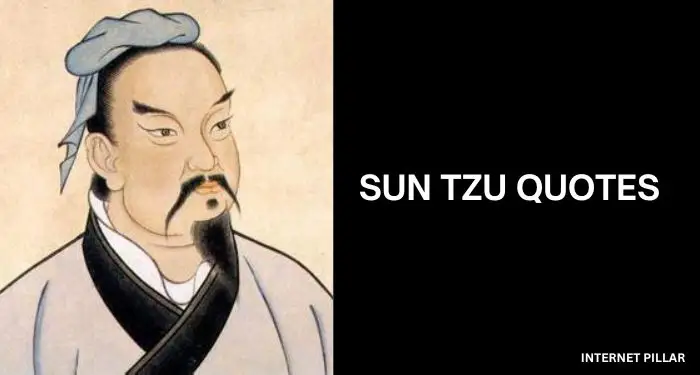
Related: Military Quotes and Sayings for Soldiers and Joseph Brant Quotes from Mohawk Military & Political Leader
This historic text, composed of thirteen chapters, continues to be studied widely today.
Despite some uncertainties surrounding his historical existence, traditional Chinese historians recognize Sun Tzu as a legendary figure, often linking him to King Helü of Wu and dating his life to 544–496 BCE.
Here are some of the inspiring quotes from Sun Tzu for you.
Best Sun Tzu Quotes
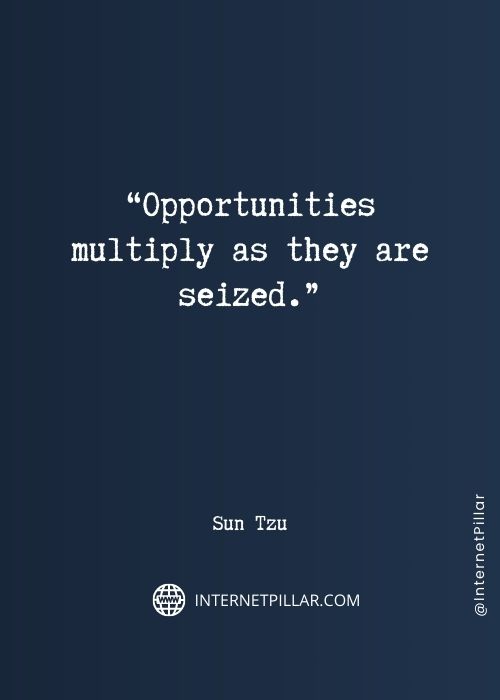
1. “Opportunities multiply as they are seized.” ~ (Sun Tzu – Author of The Art of War).

2. “You have to believe in yourself. ” ~ (Sun Tzu – Author of The Art of War).
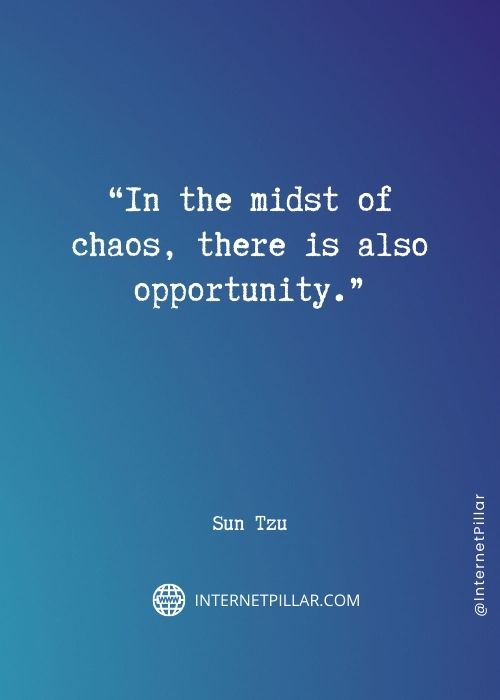
3. “In the midst of chaos, there is also opportunity.” ~ (Sun Tzu – Author of The Art of War).
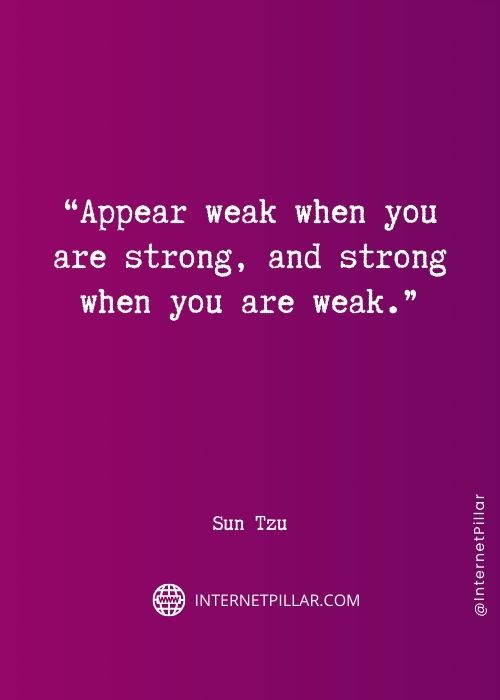
4. “Appear weak when you are strong, and strong when you are weak.” ~ (Sun Tzu – Author of The Art of War).
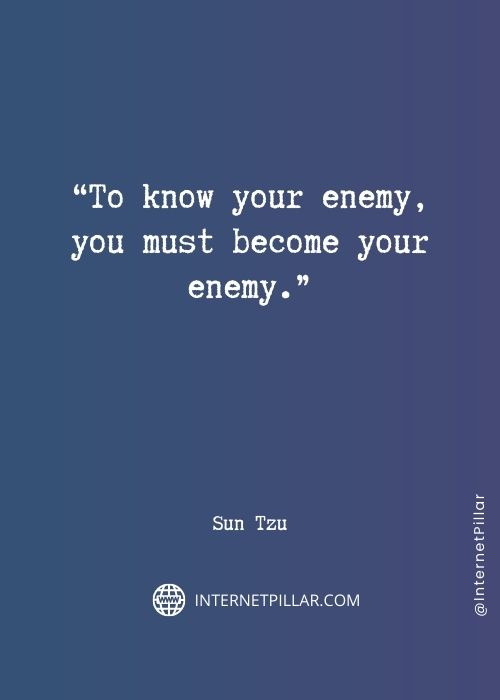
5. “To know your enemy, you must become your enemy.” ~ (Sun Tzu – Author of The Art of War).
6. “The supreme art of war is to subdue the enemy without fighting.” ~ (Sun Tzu – Author of The Art of War).
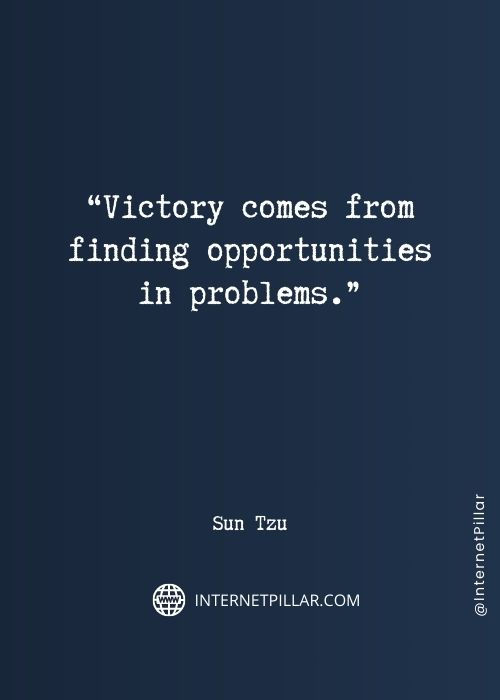
7. “Victory comes from finding opportunities in problems.” ~ (Sun Tzu – Author of The Art of War).
8. “Let your plans be dark and impenetrable as night, and when you move, fall like a thunderbolt.” ~ (Sun Tzu – Author of The Art of War).
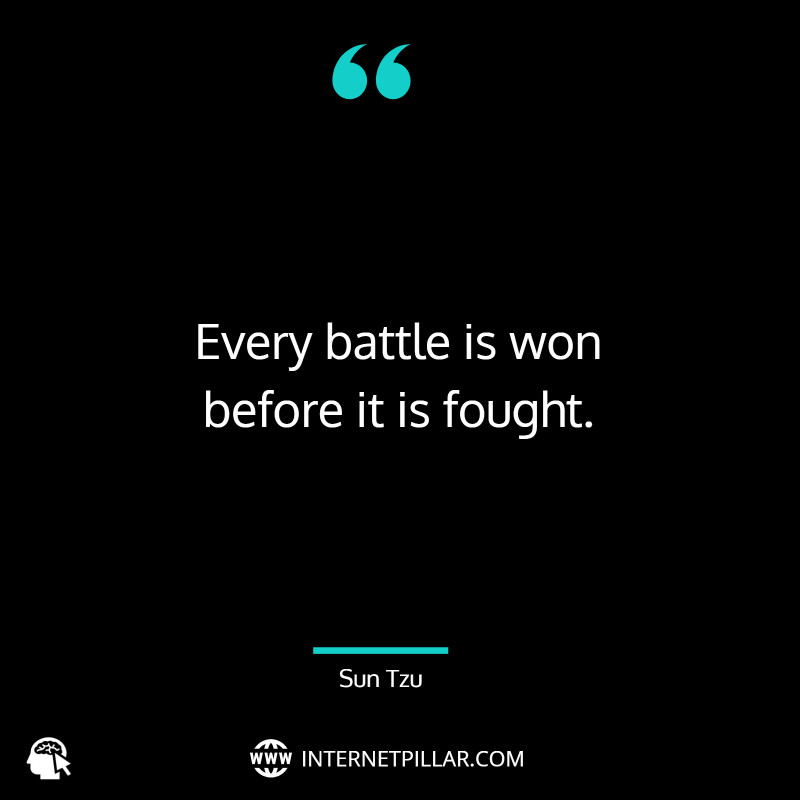
9. “Every battle is won before it is fought.” ~ (Sun Tzu – Author of The Art of War).
10. “When you surround an army, leave an outlet free. Do not press a desperate foe too hard.” ~ (Sun Tzu – Author of The Art of War).
11. “If you know the enemy and know yourself, you need not fear the result of a hundred battles. If you know yourself but not the enemy, for every victory gained you will also suffer a defeat. If you know neither the enemy nor yourself, you will succumb in every battle.” ~ (Sun Tzu – Author of The Art of War).
12. “If you wait by the river long enough, the bodies of your enemies will float by.” ~ (Sun Tzu – Author of The Art of War).
13. “The greatest victory is that which requires no battle.” ~ (Sun Tzu – Author of The Art of War).
14. “One mark of a great soldier is that he fight on his own terms or fights not at all.” ~ (Sun Tzu – Author of The Art of War).
15. “If he sends reinforcements everywhere, he will everywhere be weak.” ~ (Sun Tzu – Author of The Art of War).
16. “Treat your men as you would your own beloved sons. And they will follow you into the deepest valley.” ~ (Sun Tzu – Author of The Art of War).
17. “All is fair in love and war.” ~ (Sun Tzu – Author of The Art of War).
18. “All warfare is based on deception. Hence, when we are able to attack, we must seem unable; when using our forces, we must appear inactive; when we are near, we must make the enemy believe we are far away; when far away, we must make him believe we are near.” ~ (Sun Tzu – Author of The Art of War).
19. “Engage people with what they expect; it is what they are able to discern and confirms their projections. It settles them into predictable patterns of response, occupying their minds while you wait for the extraordinary moment – that which they cannot anticipate.” ~ (Sun Tzu – Author of The Art of War).
20. “Know yourself and you will win all battles.” ~ (Sun Tzu – Author of The Art of War).
21. “So in war, the way is to avoid what is strong, and strike at what is weak.” ~ (Sun Tzu – Author of The Art of War).
22. “Strategy without tactics is the slowest route to victory. Tactics without strategy is the noise before defeat.” ~ (Sun Tzu – Author of The Art of War).
23. “Victorious warriors win first and then go to war, while defeated warriors go to war first and then seek to win.” ~ (Sun Tzu – Author of The Art of War).
24. “Victory is reserved for those who are willing to pay its price.” ~ (Sun Tzu – Author of The Art of War).
Motivational Sun Tzu Quotes
25. “Be extremely subtle even to the point of formlessness. Be extremely mysterious even to the point of soundlessness. Thereby you can be the director of the opponent s fate.” ~ (Sun Tzu – Author of The Art of War).
26. “Plan for what it is difficult while it is easy, do what is great while it is small.” ~ (Sun Tzu – Author of The Art of War).
27. “The opportunity of defeating the enemy is provided by the enemy himself.” ~ (Sun Tzu – Author of The Art of War).

28. “Even the finest sword plunged into salt water will eventually rust.” ~ (Sun Tzu – Author of The Art of War).
29. “The nature of war is constant change.” ~ (Sun Tzu – Author of The Art of War).
30. “Those who are victorious plan effectively and change decisively. They are like a great river that maintains its course but adjusts its flow.” ~ (Sun Tzu – Author of The Art of War).
31. “Move swift as the Wind and closely-formed as the Wood. Attack like the Fire and be still as the Mountain.” ~ (Sun Tzu – Author of The Art of War).
32. “A battle avoided cannot be lost.” ~ (Sun Tzu – Author of The Art of War).
33. “Build your opponent a golden bridge to retreat across.” ~ (Sun Tzu – Author of The Art of War).
34. “He who wishes to fight must first count the cost.” ~ (Sun Tzu – Author of The Art of War).
35. “If the mind is willing, the flesh could go on and on without many things.” ~ (Sun Tzu – Author of The Art of War).
36. “Supreme excellence consists of breaking the enemy’s resistance without fighting.” ~ (Sun Tzu – Author of The Art of War).

37. “Know thy self, know thy enemy.” ~ (Sun Tzu – Author of The Art of War).
38. “When the enemy is relaxed, make them toil. When full, starve them. When settled, make them move.” ~ (Sun Tzu – Author of The Art of War).
39. “So a military force has no constant formation, water has no constant shape: the ability to gain victory by changing and adapting according to the opponent is called genius.” ~ (Sun Tzu – Author of The Art of War).
40. “Do not engage an enemy more powerful than you. And if it is unavoidable and you do have to engage, then make sure you engage it on your terms, not on your enemy’s terms.” ~ (Sun Tzu – Author of The Art of War).
41. “Great results, can be achieved with small forces.” ~ (Sun Tzu – Author of The Art of War).
42. “Ponder and deliberate before you make a move.” ~ (Sun Tzu – Author of The Art of War).
43. “First learn to become invincible, then wait for your enemy’s moment of vulnerability.” ~ (Sun Tzu – Author of The Art of War).
44. “The true objective of war is peace.” ~ (Sun Tzu – Author of The Art of War).
45. “To win one hundred victories in one hundred battles is not the acme of skill. To subdue the enemy without fighting is the acme of skill.” ~ (Sun Tzu – Author of The Art of War).
46. “When strong, avoid them. If of high morale, depress them. Seem humble to fill them with conceit. If at ease, exhaust them. If united, separate them. Attack their weaknesses. Emerge to their surprise.” ~ (Sun Tzu – Author of The Art of War).
47. “What the ancients called a clever fighter is one who not only wins, but excels in winning with ease.” ~ (Sun Tzu – Author of The Art of War).
48. “If you fight with all your might, there is a chance of life; whereas death is certain if you cling to your corner.” ~ (Sun Tzu – Author of The Art of War).
49. “If you are situated at a great distance from the enemy, and the strength of the two armies is equal, it is not easy to provoke a battle, and fighting will be to your disadvantage.” ~ (Sun Tzu – Author of The Art of War).

50. “Know thy self, know thy enemy. A thousand battles, a thousand victories.” ~ (Sun Tzu – Author of The Art of War).
Top Sun Tzu Quotes
51. “When one treats people with benevolence, justice, and righteousness, and reposes confidence in them, the army will be united in mind and all will be happy to serve their leaders’.” ~ (Sun Tzu – Author of The Art of War).
52. “The art of war is of vital importance to the State. It is a matter of life and death, a road either to safety or to ruin. Hence it is a subject of inquiry which can on no account be neglected.” ~ (Sun Tzu – Author of The Art of War).
53. “The natural formation of the country is the soldier’s best ally; but a power of estimating the adversary, of controlling the forces of victory, and of shrewdly calculating difficulties, dangers and distances, constitutes the test of a great general.” ~ (Sun Tzu – Author of The Art of War).
54. “The natural formation of the country is the soldier’s best ally.” ~ (Sun Tzu – Author of The Art of War).
55. “Know the enemy, know yourself; your victory will never be endangered. Know the ground, know the weather; your victory will then be total.” ~ (Sun Tzu – Author of The Art of War).
56. “The whole secret lies in confusing the enemy, so that he cannot fathom our real intent.” ~ (Sun Tzu – Author of The Art of War).
57. “All war is based on deception.” ~ (Sun Tzu – Author of The Art of War).
58. “However desperate the situation and circumstances, don’t despair. When there is everything to fear, be unafraid. When surrounded by dangers, fear none of them. When without resources, depend on resourcefulness. When surprised, take the enemy by surprise.” ~ (Sun Tzu – Author of The Art of War).
59. “And regulation entails organizational effectiveness, a chain of command, and a structure for logistical support.” ~ (Sun Tzu – Author of The Art of War).
60. “All warfare is based on deception. There is no place where espionage is not used. Offer the enemy bait to lure him.” ~ (Sun Tzu – Author of The Art of War).
61. “Pretend inferiority and encourage his arrogance.” ~ (Sun Tzu – Author of The Art of War).
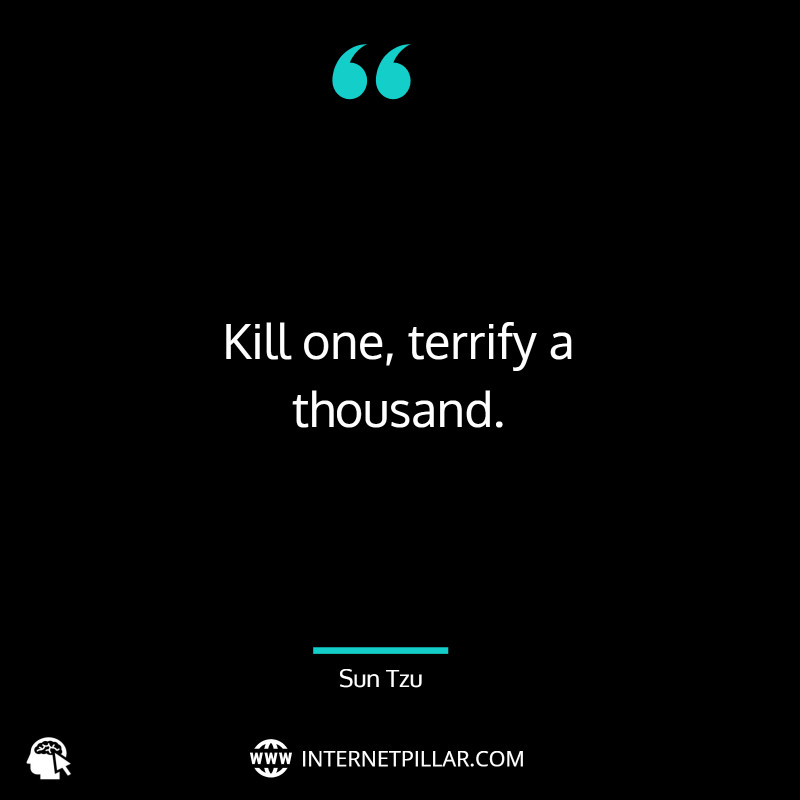
62. “Kill one, terrify a thousand.” ~ (Sun Tzu – Author of The Art of War).
63. “If words of command are not clear and distinct, if orders are not thoroughly understood, the general is to blame. But if his orders are clear, and the soldiers nevertheless disobey, then it is the fault of their officers.” ~ (Sun Tzu – Author of The Art of War).
64. “He will win who knows when to fight and when not to fight.” ~ (Sun Tzu – Author of The Art of War).
65. “The general who wins the battle makes many calculations in his temple before the battle is fought. The general who loses makes but few calculations beforehand.” ~ (Sun Tzu – Author of The Art of War).
66. “I will be able to forecast which side will be victorious and which defeated.” ~ (Sun Tzu – Author of The Art of War).
67. “All warfare is based on deception. If your enemy is superior, evade him. If angry, irritate him. If equally matched, fight and if not: split and re-evaluate.” ~ (Sun Tzu – Author of The Art of War).
68. “Regard your soldiers as your children, and they will follow you into the deepest valleys; look upon them as your own beloved sons, and they will stand by you even unto death.” ~ (Sun Tzu – Author of The Art of War).
69. “It is the rule in war, if ten times the enemy’s strength, surround them; if five times, attack them; if double, be able to divide them; if equal, engage them; if fewer, be able to evade them; if weaker, be able to avoid them.” ~ (Sun Tzu – Author of The Art of War).
70. “Ground which can be abandoned but is hard to re-occupy is called entangling.” ~ (Sun Tzu – Author of The Art of War).
71. “The Art of War is self-explanatory.” ~ (Sun Tzu – Author of The Art of War).
72. “Concentrate your energy and hoard your strength.” ~ (Sun Tzu – Author of The Art of War).
73. “Thus it is that in war the victorious strategist only seeks battle after the victory has been won, whereas he who is destined to defeat first fights and afterwards looks for victory.” ~ (Sun Tzu – Author of The Art of War).
74. “Invincibility lies in the defense; the possibility of victory in the attack.” ~ (Sun Tzu – Author of The Art of War).
75. “Keep their friends close and their enemies closer.” ~ (Sun Tzu – Author of The Art of War).
76. “If fighting is sure to result in victory, then you must fight.” ~ (Sun Tzu – Author of The Art of War).
77. “All men can see these tactics whereby I conquer, but what none can see is the strategy out of which victory is evolved.” ~ (Sun Tzu – Author of The Art of War).
78. “He will win who, prepared himself, waits to take the enemy unprepared.” ~ (Sun Tzu – Author of The Art of War).
79. “He who relies solely on warlike measures shall be exterminated; he who relies solely on peaceful measures shall perish.” ~ (Sun Tzu – Author of The Art of War).

80. “Be subtle! be subtle! and use your spies for every kind of business.” ~ (Sun Tzu – Author of The Art of War).
81. “Whoever is first in the field and awaits the coming of the enemy, will be fresh for the fight; whoever is second in the field and has to hasten to battle will arrive exhausted.” ~ (Sun Tzu – Author of The Art of War).
82. “If you know yourself but not the enemy, for every victory gained you will also suffer a defeat.” ~ (Sun Tzu – Author of The Art of War).
83. “Don’t flail against the world, use it. Flexibility is the operative principle in the art of war.” ~ (Sun Tzu – Author of The Art of War).
84. “In war, numbers alone confer no advantage. Do not advance relying on sheer military power.” ~ (Sun Tzu – Author of The Art of War).
85. “If your opponent is of choleric temper, seek to irritate him. Pretend to be weak, that he may grow arrogant.” ~ (Sun Tzu – Author of The Art of War).
86. “When the thunderclap comes, there is no time to cover the ears.” ~ (Sun Tzu – Author of The Art of War).
87. “Subtle and insubstantial, the expert leaves no trace; divinely mysterious, he is inaudible. Thus he is master of his enemy’s fate.” ~ (Sun Tzu – Author of The Art of War).
88. “One need not destroy one’s enemy. One need only destroy his willingness to engage.” ~ (Sun Tzu – Author of The Art of War).
89. “Therefore, to estimate the enemy situation and to calculate distances and the degree of difficulty of the terrain so as to control victory are virtues of the superior general.” ~ (Sun Tzu – Author of The Art of War).
90. “A leader leads by example not by force.” ~ (Sun Tzu – Author of The Art of War).
91. “Be where your enemy is not.” ~ (Sun Tzu – Author of The Art of War).
92. “Thus the expert in battle moves the enemy, and is not moved by him.” ~ (Sun Tzu – Author of The Art of War).
93. “When torrential water tosses boulders, it is because of its momentum. When the strike of a hawk breaks the body of its prey, it is because of timing.” ~ (Sun Tzu – Author of The Art of War).
94. “All wars are won or lost before they are ever fought.” ~ (Sun Tzu – Author of The Art of War).
95. “Weak leadership can wreck the soundest strategy.” ~ (Sun Tzu – Author of The Art of War).
96. “He whose ranks are united in purpose will be victorious.” ~ (Sun Tzu – Author of The Art of War).
97. “In war, then, let your great object be victory, not lengthy campaigns.” ~ (Sun Tzu – Author of The Art of War).
98. “Correct your mistake as soon as you have found it.” ~ (Sun Tzu – Author of The Art of War).
99. “You cannot know if you will be successful or not. You can only prepare for battle and it must be done with all of your heart and with all of your consciousness. In that manner, you will have an edge.” ~ (Sun Tzu – Author of The Art of War).
100. “Move not unless you see an advantage; use not your troops unless there is something to be gained; fight not unless the position is critical.” ~ (Sun Tzu – Author of The Art of War).
Famous Sun Tzu Quotes
101. “He will win whose army is animated by the same spirit throughout all its ranks.” ~ (Sun Tzu – Author of The Art of War).
102. “War is a matter of vital importance to the state; the province of life or death; the road to survival or ruin. It is mandatory that it be thoroughly studied.” ~ (Sun Tzu – Author of The Art of War).
103. “What is of supreme importance in war is to attack the enemy’s strategy.” ~ (Sun Tzu – Author of The Art of War).
104. “Humble words and increased preparations are signs that the enemy is about to advance. Violent language and driving forward as if to the attack are signs that he will retreat.” ~ (Sun Tzu – Author of The Art of War).
105. “He who is prudent and lies in wait for an enemy who is not, will be victorious.” ~ (Sun Tzu – Author of The Art of War).
106. “Rely not on the likelihood of the enemy’s not coming, but on our own readiness to receive him.” ~ (Sun Tzu – Author of The Art of War).
107. “The clever combatant imposes his will on the enemy, but does not allow the enemy’s will to be imposed on him.” ~ (Sun Tzu – Author of The Art of War).
108. “One may know how to conquer without being able to do it.” ~ (Sun Tzu – Author of The Art of War).
109. “To Subdue an enemy without fighting is the greatest of skills.” ~ (Sun Tzu – Author of The Art of War).
110. “Therefore, just as water retains no constant shape, so in warfare there are no constant conditions.” ~ (Sun Tzu – Author of The Art of War).
111. “If an enemy has alliances, the problem is grave and the enemy’s position strong; if he has no alliances, the problem is minor and the enemy’s position weak.” ~ (Sun Tzu – Author of The Art of War).
112. “Until death itself comes, no calamity need be feared.” ~ (Sun Tzu – Author of The Art of War).
113. “What is essential in war is victory, not prolonged operations.” ~ (Sun Tzu – Author of The Art of War).
114. “These are the six ways of courting defeat – neglect to estimate the enemy’s strength; want of authority; defective training; unjustifiable anger; nonobservance of discipline; failure to use picked men…” ~ (Sun Tzu – Author of The Art of War).
115. “Ultimate excellence lies not in winning every battle, but in defeating the enemy without ever fighting.” ~ (Sun Tzu – Author of The Art of War).
116. “Hold out baits to entice the enemy. Feign disorder, and crush him.” ~ (Sun Tzu – Author of The Art of War).
117. “Rapidity is the essence of war: take advantage of the enemy’s unreadiness, make your way by unexpected routes, and attack unguarded spots.” ~ (Sun Tzu – Author of The Art of War).
118. “Those whose upper and lower ranks have the same desire are victorious.” ~ (Sun Tzu – Author of The Art of War).
119. “Against those skilled in attack, an enemy does not know where to defend; against the experts in defense, the enemy does not know where to attack.” ~ (Sun Tzu – Author of The Art of War).
120. “So the principles of warfare are: Do not depend on the enemy not coming, but depend on our readiness against him. Do not depend on the enemy not attacking, but depend on our position that cannot be attacked.” ~ (Sun Tzu – Author of The Art of War).
121. “The skillful employer of men will employ the wise man, the brave man, the covetous man, and the stupid man.” ~ (Sun Tzu – Author of The Art of War).
122. “There are routes not to be followed, armies not to be attacked, citadels not to be besieged, territory not to be fought over.” ~ (Sun Tzu – Author of The Art of War).
123. “In warfare, first lay plans which will ensure victory, and then lead your army to battle; if you will not begin with stratagem but rely on brute strength alone, victory will no longer be assured.” ~ (Sun Tzu – Author of The Art of War).
124. “There is no instance of a nation benefitting from prolonged warfare.” ~ (Sun Tzu – Author of The Art of War).
125. “If, however, you are indulgent but unable to make your authority felt; kind-hearted, but unable to enforce your commands; and incapable, moreover, of quelling disorder: then your soldiers must be likened to spoilt children; they are useless for any practical purpose.” ~ (Sun Tzu – Author of The Art of War).
126. “Rouse him, and learn the principle of his activity or inactivity. Force him to reveal himself, so as to find out his vulnerable spots.” ~ (Sun Tzu – Author of The Art of War).
127. “The quality of decision is like the well-timed swoop of a falcon which enables it to strike and destroy its victim.” ~ (Sun Tzu – Author of The Art of War).
128. “A kingdom that has once been destroyed can never come again into being; nor can the dead ever be brought back to life.” ~ (Sun Tzu – Author of The Art of War).
129. “So there are five ways of knowing who will win. Those who know when to fight and when not to fight are victorious. Those who discern when to use many or few troops are victorious. Those whose upper and lower ranks have the same desire are victorious.” ~ (Sun Tzu – Author of The Art of War).
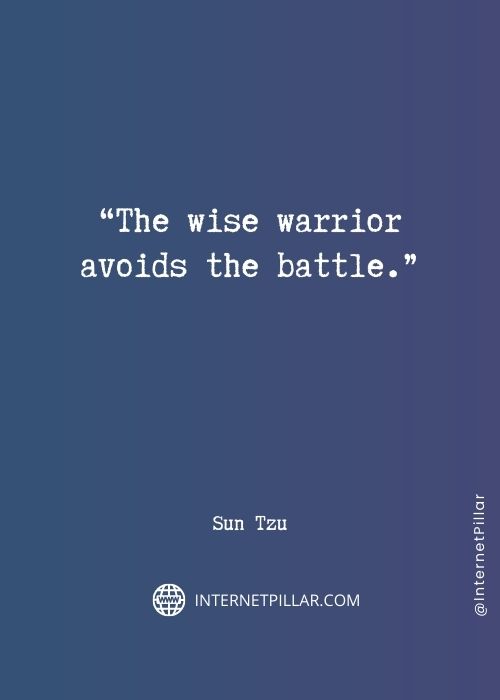
130. “The wise warrior avoids the battle.” ~ (Sun Tzu – Author of The Art of War).
131. “The line between disorder and order lies in logistics…” ~ (Sun Tzu – Author of The Art of War).
132. “In all fighting, the direct method may be used for joining battle, but indirect methods will be needed in order to secure victory.” ~ (Sun Tzu – Author of The Art of War).
133. “Without harmony in the State, no military expedition can be undertaken; without harmony in the army, no battle array can be formed.” ~ (Sun Tzu – Author of The Art of War).
134. “Too frequent rewards indicate that the general is at the end of his resources; too frequent punishments that he is in acute distress.” ~ (Sun Tzu – Author of The Art of War).
135. “Making no mistakes is what establishes the certainty of victory, for it means conquering an enemy that is already defeated.” ~ (Sun Tzu – Author of The Art of War).
136. “Go into emptiness, strike voids, bypass what he defends hit him where he does not expect you.” ~ (Sun Tzu – Author of The Art of War).
137. “O divine art of subtlety and secrecy! Through You, we learn to be invisible, through you inaudible and hence we can hold the enemy’s fate in our hands.” ~ (Sun Tzu – Author of The Art of War).
138. “If we do not wish to fight, we can prevent the enemy from engaging us even though the lines of our encampment be merely traced out on the ground. All we need to do is to throw something odd and unaccountable in his way.” ~ (Sun Tzu – Author of The Art of War).
139. “A sovereign of high character and intelligence must be able to know the right man, should place the responsibility on him, and expect results.” ~ (Sun Tzu – Author of The Art of War).
140. “It is a doctrine of war not to assume the enemy will not come, but rather to rely on one’s readiness to meet him; not to presume that he will not attack, but rather to make one’s self invincible.” ~ (Sun Tzu – Author of The Art of War).
141. “Carefully compare the opposing army with your own, so that you may know where strength is superabundant and where it is deficient.” ~ (Sun Tzu – Author of The Art of War).
142. “Unless you know the mountains and the forests, the defiles and impasses, the lay of the marshes and swamps, you cannot maneuver with an armed force. Unless you use local guides, you cannot get the advantages of the land.” ~ (Sun Tzu – Author of The Art of War).
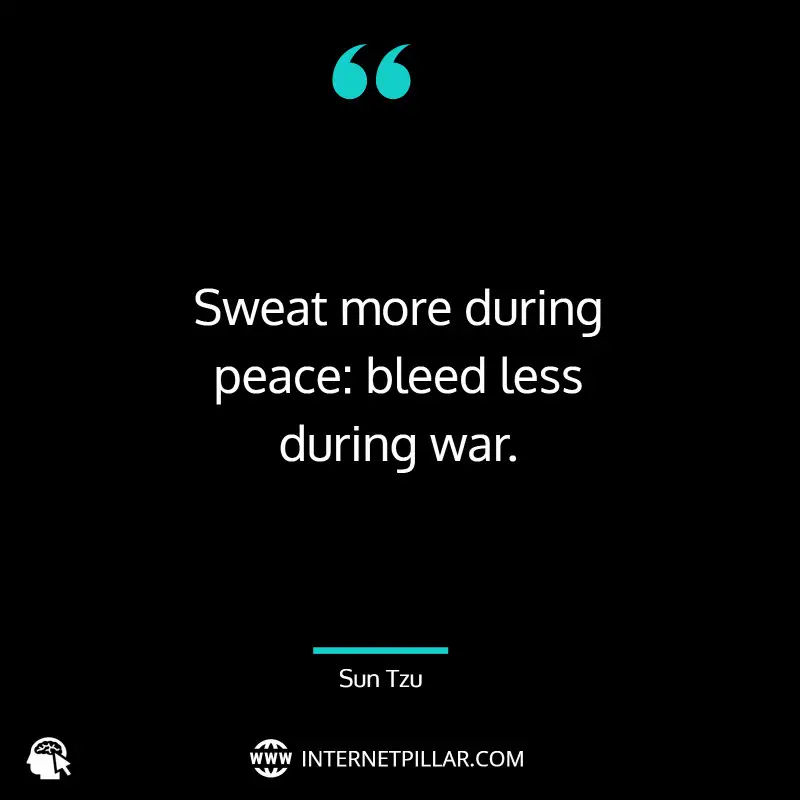
143. “Sweat more during peace: bleed less during war.” ~ (Sun Tzu – Author of The Art of War).
144. “If I am able to determine the enemy’s dispositions while at the same time I conceal my own, then I can concentrate and he must divide.” ~ (Sun Tzu – Author of The Art of War).
145. “If there is a disturbance in the camp, the general’s authority is weak. If the banners and flags are shifted about, sedition is afoot. If the officers are angry, it means that the men are weary.” ~ (Sun Tzu – Author of The Art of War).
146. “Those skilled in attack move as from above the nine-fold heavens. Thus they are capable both of protecting themselves and of gaining complete victory.” ~ (Sun Tzu – Author of The Art of War).
147. “Prohibit the taking of omens, and do away with superstitious doubts. Then, until death itself comes, no calamity need be feared.” ~ (Sun Tzu – Author of The Art of War).
148. “Thus, though I have heard of successful military operations that were clumsy but swift, cleverness has never been seen associated with long delays.” ~ (Sun Tzu – Author of The Art of War).
149. “The rising of birds in their flight is the sign of an ambuscade. Startled beasts indicate that a sudden attack is coming.” ~ (Sun Tzu – Author of The Art of War).
150. “Maneuvering with an army is advantageous; with an undisciplined multitude, most dangerous.” ~ (Sun Tzu – Author of The Art of War).
Short Sun Tzu Quotes
151. “There are roads which must not be followed, armies which must not be attacked, towns which must not be besieged, positions which must not be contested, commands of the sovereign which must not be obeyed.” ~ (Sun Tzu – Author of The Art of War).
152. “The consummate leader cultivates the moral law, and strictly adheres to method and discipline; thus it is in his power to control success.” ~ (Sun Tzu – Author of The Art of War).
153. “Wheels of justice grind slow but grind fine.” ~ (Sun Tzu – Author of The Art of War).
154. “Pretend to be weak, so your enemy may grow arrogant.” ~ (Sun Tzu – Author of The Art of War).
155. “The best general is the one who never fights.” ~ (Sun Tzu – Author of The Art of War).
156. “It is more important to outthink your enemy, than to outfight him.” ~ (Sun Tzu – Author of The Art of War).
157. “Therefore a victorious army first wins and then seeks battle; a defeated army first battles and then seeks victory.” ~ (Sun Tzu – Author of The Art of War).
158. “It is the business of a general to be serene and inscrutable, impartial and self-controlled.” ~ (Sun Tzu – Author of The Art of War).
159. “When your opponent gives you an opening, be swift as a hare.” ~ (Sun Tzu – Author of The Art of War).
160. “The peak efficiency of knowledge and strategy is to make conflict unnecessary.” ~ (Sun Tzu – Author of The Art of War).
161. “An army may be likened to water, for just as flowing water avoids the heights and hastens to the lowlands, so an army avoids strength and strikes weakness.” ~ (Sun Tzu – Author of The Art of War).
162. “A military operation involves deception. Even though you are competent, appear to be incompetent. Though effective, appear to be ineffective.” ~ (Sun Tzu – Author of The Art of War).
163. “What is of the greatest importance in war is extraordinary speed: One cannot afford to neglect the opportunity.” ~ (Sun Tzu – Author of The Art of War).
164. “Thus the highest form of generalship is to balk the enemy’s plans, the next best is to prevent the junction of the enemy’s forces, the next in order is to attack the enemy’s army in the field, and the worst policy of all is to besiege walled cities.” ~ (Sun Tzu – Author of The Art of War).
165. “Convince your enemy that he will gain very little by attacking you; this will diminish his enthusiasm.” ~ (Sun Tzu – Author of The Art of War).
166. “If a battle can not be won do not fight it.” ~ (Sun Tzu – Author of The Art of War).
167. “A warrior who is prepared to fight must also be prepared to die.” ~ (Sun Tzu – Author of The Art of War).
168. “Those who excel in war first cultivate their own humanity and maintain their laws and institutions. By these means they make their governments invincible.” ~ (Sun Tzu – Author of The Art of War).
169. “When he pretends to flee, do not pursue.” ~ (Sun Tzu – Author of The Art of War).
170. “He who knows his enemy and himself well will not be defeated easily.” ~ (Sun Tzu – Author of The Art of War).
171. “The art of war teaches us to rely not on the likelihood of the enemy’s not coming, but on our own readiness to receive him; not on the chance of his not attacking, but rather on the fact that we have made our position unassailable.” ~ (Sun Tzu – Author of The Art of War).
172. “If not in the interests of the state, do not act. If you cannot succeed, do not use troops. If you are not in danger, do not fight.” ~ (Sun Tzu – Author of The Art of War).
173. “He will win who has military capacity and is not interfered with by the sovereign.” ~ (Sun Tzu – Author of The Art of War).
174. “When campaigning, be swift as the wind; in leisurely march, majestic as the forest; in raiding and plundering, like fire; in standing, firm as the mountains. As unfathomable as the clouds, move like a thunderbolt.” ~ (Sun Tzu – Author of The Art of War).
175. “The military has no constant form, just as water has no constant shape – adapt as you face the enemy, without letting them know beforehand what you are going to do.” ~ (Sun Tzu – Author of The Art of War).
176. “When the leader is morally weak and his discipline not strict, when his instructions and guidance are not enlightened, when there are no consistent rules, neighboring rulers will take advantage of this.” ~ (Sun Tzu – Author of The Art of War).
177. “Therefore I say: know the enemy and know yourself; in a hundred battles you will never be in peril. When you are ignorant of the enemy but know yourself, your chances of winning or losing are equal. If ignorant both of your enemy and of yourself, you are certain in every battle to be in peril.” ~ (Sun Tzu – Author of The Art of War).
178. “Rewards for good service should not be deferred a single day.” ~ (Sun Tzu – Author of The Art of War).
179. “Energy may be likened to the bending of a crossbow; decision, to the releasing of a trigger.” ~ (Sun Tzu – Author of The Art of War).
180. “When the enemy is at ease, be able to weary him; when well fed, to starve him; when at rest, to make him move. Appear at places to which he must hasten; move swiftly where he does not expect you.” ~ (Sun Tzu – Author of The Art of War).
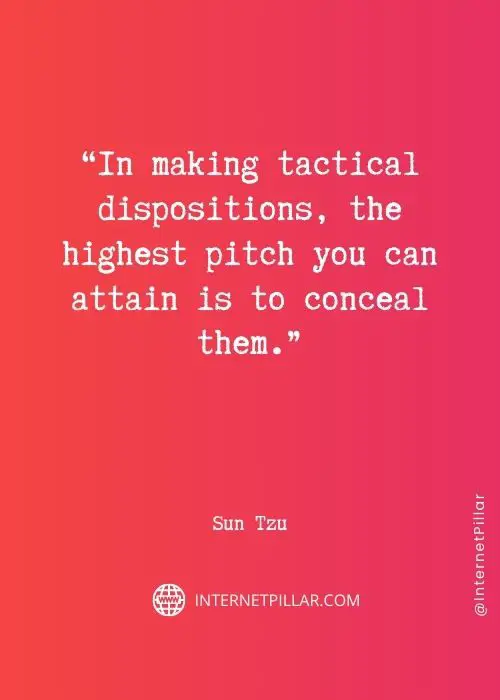
181. “In making tactical dispositions, the highest pitch you can attain is to conceal them.” ~ (Sun Tzu – Author of The Art of War).
182. “Ponder and deliberate before you make your move. He will conquer who has learned the artifice of deviation. Such is the art of maneuvering.” ~ (Sun Tzu – Author of The Art of War).
183. “If you are far from the enemy, make him believe you are near.” ~ (Sun Tzu – Author of The Art of War).
184. “If this is long delayed, weapons are blunted and morale depressed.” ~ (Sun Tzu – Author of The Art of War).
185. “If you know both yourself and your enemy, you can win a hundred battles without a single loss.” ~ (Sun Tzu – Author of The Art of War).
186. “The art of giving orders is not to try to rectify the minor blunders and not be swayed by petty doubts.” ~ (Sun Tzu – Author of The Art of War).
187. “The business of a general is to kick away the ladder behind soldiers when they have climbed up a height.” ~ (Sun Tzu – Author of The Art of War).
188. “If it is to your advantage, make a forward move; if not, stay where you are.” ~ (Sun Tzu – Author of The Art of War).
189. “The control of a large force is the same principle as the control of a few men: it is merely a question of dividing up their numbers.” ~ (Sun Tzu – Author of The Art of War).
190. “O divine art of subtlety and secrecy!” ~ (Sun Tzu – Author of The Art of War).
191. “There is no place where espionage is not possible.” ~ (Sun Tzu – Author of The Art of War).
192. “When the common soldiers are too strong and their officers too weak, the result is insubordination. When the officers are too strong and the common soldiers too weak, the result is collapse.” ~ (Sun Tzu – Author of The Art of War).
193. “The spot where we intend to fight must not be made known; for then the enemy will have to prepare against a possible attack at several different points; and his forces being thus distributed in many directions, the numbers we shall have to face at any given point will be proportionately few.” ~ (Sun Tzu – Author of The Art of War).
194. “Appear at points which the enemy must hasten to defend; march swiftly to places where you are not expected.” ~ (Sun Tzu – Author of The Art of War).
195. “In desperate position, you must fight.” ~ (Sun Tzu – Author of The Art of War).
196. “If we wish to fight, the enemy can be forced to an engagement even though he be sheltered behind a high rampart and a deep ditch. All we need do is attack some other place that he will be obliged to relieve.” ~ (Sun Tzu – Author of The Art of War).
197. “Hence the saying: If you know the enemy and you know yourself, your victory will not stand in doubt; if you know Heaven and you know Earth, you may make your victory complete.” ~ (Sun Tzu – Author of The Art of War).
198. “Attack where he is unprepared; sally forth when he does not expect you.” ~ (Sun Tzu – Author of The Art of War).
199. “If you follow the enemy’s shifts and changes, you can always find a way to win.” ~ (Sun Tzu – Author of The Art of War).
200. “Winning Strategists are certain of triumph before seeking a challenge. Losing Strategists are certain to challenge before seeking a triumph.” ~ (Sun Tzu – Author of The Art of War).
Inspiring Sun Tzu Quotes
201. “Should the enemy strengthen his van, he will weaken his rear; should he strengthen his rear, he will weaken his van; should he strengthen his left, he will weaken his right; should he strengthen his right, he will weaken his left. If he sends reinforcements everywhere, he will everywhere be weak.” ~ (Sun Tzu – Author of The Art of War).
202. “If your enemy is superior, evade him.” ~ (Sun Tzu – Author of The Art of War).
203. “If fighting is sure to result in victory, then you must fight, even though the ruler forbid it; if fighting will not result in victory, then you must not fight even at the ruler’s bidding.” ~ (Sun Tzu – Author of The Art of War).
204. “The successful person has unusual skill at dealing with conflict and ensuring the best outcome for all.” ~ (Sun Tzu – Author of The Art of War).
205. “Without local guides, your enemy employs the land as a weapon against you.” ~ (Sun Tzu – Author of The Art of War).
206. “Do not swallow bait offered by the enemy. Do not interfere with an army that is returning home.” ~ (Sun Tzu – Author of The Art of War).
207. “There are not more than five primary colors, yet in combination, they produce more hues than can ever been seen.” ~ (Sun Tzu – Author of The Art of War).
208. “When you know both yourself as well as your competition, you are never in danger. To know yourself and not others, gives you half a chance of winning. Knowing neither yourself or your competition puts you in a position to lose.” ~ (Sun Tzu – Author of The Art of War).
209. “He who wishes to fight must first count the cost. When you engage in actual fighting, if victory is long in coming, then men’s weapons will grow dull and their ardor will be dampened. If you lay siege to a town, you will exhaust your strength.” ~ (Sun Tzu – Author of The Art of War).
210. “Like the sun and moon, they end but to begin anew; like the four seasons, they pass away to return once more.” ~ (Sun Tzu – Author of The Art of War).
211. “Place your army in deadly peril, and it will survive; plunge it into desperate straits, and it will come off in safety.” ~ (Sun Tzu – Author of The Art of War).
212. “Generally in war the best policy is to take a state intact; to ruin it is inferior to this.” ~ (Sun Tzu – Author of The Art of War).
213. “When you shoot a bow and arrow, you aim at the clouds, not because you expect to hit them, but so that you may reach the distant target on the ground.” ~ (Sun Tzu – Author of The Art of War).
214. “In war, practice dissimulation and you will succeed.” ~ (Sun Tzu – Author of The Art of War).
215. “The height of strategy, is to attack your opponent’s strategy.” ~ (Sun Tzu – Author of The Art of War).
216. “Quickness is the essence of the war.” ~ (Sun Tzu – Author of The Art of War).
217. “He who exercises no forethought but makes light of his opponents is sure to be captured by them.” ~ (Sun Tzu – Author of The Art of War).
218. “If ignorant both of your enemy and yourself, you are certain to be in peril.” ~ (Sun Tzu – Author of The Art of War).
219. “The clever combatant looks to the effect of combined energy, and does not require too much from individuals. Hence his ability to pick out the right men and utilize combined energy.” ~ (Sun Tzu – Author of The Art of War).
220. “In all history, there is no instance of a country having benefited from prolonged warfare. Only one who knows the disastrous effects of a long war can realize the supreme importance of rapidity in bringing it to a close.” ~ (Sun Tzu – Author of The Art of War).
221. “When he utilizes combined energy, his fighting men become as it were like unto rolling logs or stones. For it is the nature of a log or stone to remain motionless on level ground, and to move when on a slope; if four-cornered, to come to a standstill, but if round-shaped to go rolling down.” ~ (Sun Tzu – Author of The Art of War).
222. “It is only one who is thoroughly acquainted with the evils of war that can thoroughly understand the profitable way of carrying it on.” ~ (Sun Tzu – Author of The Art of War).
223. “One defends when his strength is inadequate, he attacks when it is abundant.” ~ (Sun Tzu – Author of The Art of War).
224. “Victory is the main object in war.” ~ (Sun Tzu – Author of The Art of War).
225. “Weigh the situation, then move.” ~ (Sun Tzu – Author of The Art of War).
226. “The opportunity to secure ourselves against defeat lies in our own hands.” ~ (Sun Tzu – Author of The Art of War).
227. “Nothing is more difficult than the art of maneuver. What is difficult about maneuver is to make the devious route the most direct and to turn misfortune to advantage.” ~ (Sun Tzu – Author of The Art of War).
228. “If you know neither the enemy nor yourself, you will succumb in every battle.” ~ (Sun Tzu – Author of The Art of War).
229. “If you are strong, appear weak. But if you are weak, appear strong.” ~ (Sun Tzu – Author of The Art of War).
230. “Unhappy is the fate of one who tries to win his battles and succeed in his attacks without cultivating the spirit of enterprise, for the result is waste of time and general stagnation.” ~ (Sun Tzu – Author of The Art of War).
231. “Begin by seizing something which your opponent holds dear; then he will be amenable to your will.” ~ (Sun Tzu – Author of The Art of War).
232. “In warfare, there are no constant conditions. He who can modify his tactics in relation to his opponent will succeed and win.” ~ (Sun Tzu – Author of The Art of War).
233. “Who does not know the evils of war cannot appreciate its benefits.” ~ (Sun Tzu – Author of The Art of War).
234. “And therefore only the enlightened sovereign and the worthy general who are able to use the most intelligent people as agents are certain to achieve great things.” ~ (Sun Tzu – Author of The Art of War).
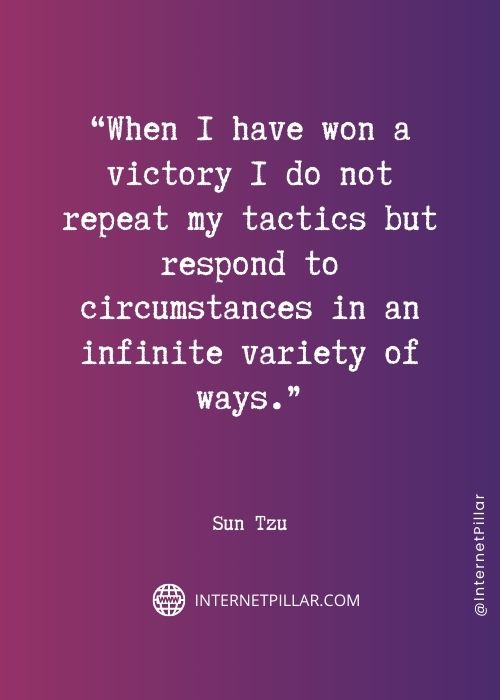
235. “When I have won a victory I do not repeat my tactics but respond to circumstances in an infinite variety of ways.” ~ (Sun Tzu – Author of The Art of War).
236. “The good fighters of old first put themselves beyond the possibility of defeat, and then waited for an opportunity of defeating the enemy.” ~ (Sun Tzu – Author of The Art of War).
237. “So in war, the way is to avoid what is strong and to strike at what is weak. Water shapes its course according to the nature of the ground over which it flows; the soldier works out his victory in relation to the foe whom he is facing.” ~ (Sun Tzu – Author of The Art of War).
238. “Set the troops to their tasks without imparting your designs.” ~ (Sun Tzu – Author of The Art of War).
239. “Being unconquerable lies with yourself; being conquerable lies with your enemy.” ~ (Sun Tzu – Author of The Art of War).
240. “The dance of battle is always played to the same impatient rhythm. What begins in a surge of violent motion is always reduced to the perfectly still.” ~ (Sun Tzu – Author of The Art of War).
241. “And therefore those skilled in war bring the enemy to the field of battle and are not brought there by him.” ~ (Sun Tzu – Author of The Art of War).
242. “If quick, I survive. If not quick, I am lost. This is death.” ~ (Sun Tzu – Author of The Art of War).
243. “Management of many is the same as management of few. It is a matter of organization.” ~ (Sun Tzu – Author of The Art of War).
244. “There is an intelligent way to eat a live frog – I just don’t know what it is.” ~ (Sun Tzu – Author of The Art of War).
245. “The King is only fond of words, and cannot translate them into deeds.” ~ (Sun Tzu – Author of The Art of War).
246. “In the practical art of war, the best thing of all is to take the enemy’s country whole and intact; to shatter and destroy it is not so good.” ~ (Sun Tzu – Author of The Art of War).
247. “The enlightened ruler is heedful, and the good general full of caution.” ~ (Sun Tzu – Author of The Art of War).
248. “The general that hearkens to my counsel and acts upon it, will conquer: let such a one be retained in command! The general that hearkens not to my counsel nor acts upon it, will suffer defeat: – let such a one be dismissed!” ~ (Sun Tzu – Author of The Art of War).
249. “Of all those in the army close to the commander none is more intimate than the secret agent; of all rewards none more liberal than those given to secret agents; of all matters none is more confidential than those relating to secret operations.” ~ (Sun Tzu – Author of The Art of War).
250. “Perfection in war lies in so sapping your opponents will that he surrenders without fighting.” ~ (Sun Tzu – Author of The Art of War).
Sun Tzu Quotes on War
251. “Now the reason the enlightened prince and the wise general conquer the enemy whenever they move and their achievements surpass those of ordinary men is foreknowledge.” ~ (Sun Tzu – Author of The Art of War).
252. “Apparent confusion is a product of good order; apparent cowardice, of courage; apparent weakness, of strength.” ~ (Sun Tzu – Author of The Art of War).
253. “Secret operations are essential in war; upon them the army relies to make its every move.” ~ (Sun Tzu – Author of The Art of War).
254. “Hiding order beneath the cloak of disorder is simply a question of subdivision; concealing courage under a show of timidity presupposes a fund of latent energy; masking strength with weakness is to be effected by tactical dispositions.” ~ (Sun Tzu – Author of The Art of War).
255. “Agitate him and ascertain the pattern of his movement.” ~ (Sun Tzu – Author of The Art of War).
256. “If those who are sent to draw water begin by drinking themselves, the army is suffering from thirst.” ~ (Sun Tzu – Author of The Art of War).
257. “We cannot enter into alliances until we are acquainted with the designs of our neighbors. We are not fit to lead an army on the march unless we are familiar with the face of the country…” ~ (Sun Tzu – Author of The Art of War).
258. “Probe him and learn where his strength is abundant and where deficient.” ~ (Sun Tzu – Author of The Art of War).
259. “A wise general makes a point of foraging of the enemy.” ~ (Sun Tzu – Author of The Art of War).
260. “You can prevent your opponent from defeating you through defense, but you cannot defeat him without taking the offensive.” ~ (Sun Tzu – Author of The Art of War).
261. “Spies are a most important element in water, because on them depends an army’s ability to move.” ~ (Sun Tzu – Author of The Art of War).
262. “It is sufficient to estimate the enemy situation correctly and to concentrate your strength to capture him. There is no more to it than this. He who lacks foresight and underestimates his enemy will surely be captured by him.” ~ (Sun Tzu – Author of The Art of War).
263. “Success in warfare is gained by carefully accommodating ourselves to the enemy’s purpose.” ~ (Sun Tzu – Author of The Art of War).
264. “Act after having made assessments. The one who first knows the measure of far and near wins – this is the rule of armed struggle.” ~ (Sun Tzu – Author of The Art of War).
265. “To capture the enemy’s entire army is better than to destroy it; to take intact a regiment, a company, or a squad is better than to destroy them. For to win one hundred victories in one hundred battles is not the supreme of excellence. To subdue the enemy without fighting is the supreme excellence.” ~ (Sun Tzu – Author of The Art of War).
266. “Amid the turmoil and tumult of battle, there may be seeming disorder and yet no real disorder at all.” ~ (Sun Tzu – Author of The Art of War).
267. “Those skilled at making the enemy move do so by creating a situation to which he must conform; they entice him with something he is certain to take, and with lures of ostensible profit they await him in strength.” ~ (Sun Tzu – Author of The Art of War).
268. “In the midst of difficulties we are always ready to seize an advantage, we may extricate ourselves from misfortune.” ~ (Sun Tzu – Author of The Art of War).
269. “For the wise man delights in establishing his merit, the brave man likes to show his courage in action, the covetous man is quick at seizing advantages, and the stupid man has no fear of death.” ~ (Sun Tzu – Author of The Art of War).
270. “Therefore the skillful leader subdues the enemy’s troops without any fighting; he captures their cities without laying siege to them; he overthrows their kingdom without lengthy operations in the field.” ~ (Sun Tzu – Author of The Art of War).
Inspirational Sun Tzu Quotes
271. “Those who would wage war, should first eliminate all domestic enemies before proceeding to attack the external foe.” ~ (Sun Tzu – Author of The Art of War).
272. “If soldiers are punished before they have grown attached to you, they will not prove submissive; and, unless submissive, then will be practically useless. If, when the soldiers have become attached to you, punishments are not enforced, they will still be unless.” ~ (Sun Tzu – Author of The Art of War).
273. “Fierce language and pretentious advances are signs that the enemy is about to retreat.” ~ (Sun Tzu – Author of The Art of War).
274. “What enables the wise sovereign and the good general to strike and conquer, and achieve things beyond the reach of ordinary men, is foreknowledge.” ~ (Sun Tzu – Author of The Art of War).
275. “The ultimate in disposing one’s troops is to be without ascertainable shape. Then the most penetrating spies cannot pry in nor can the wise lay plans against you.” ~ (Sun Tzu – Author of The Art of War).
276. “Know the enemy and know yourself.” ~ (Sun Tzu – Author of The Art of War).
277. “To capture an enemy’s army is better than to destroy it.” ~ (Sun Tzu – Author of The Art of War).
278. “It is through the dispositions of an army that its condition may be discovered. Conceal your dispositions, and your condition will remain secret, which leads to victory,; show your dispositions, and your condition will become patent, which leads to defeat.” ~ (Sun Tzu – Author of The Art of War).
279. “Without subtle ingenuity of mind, one cannot make certain of the truth of their reports.” ~ (Sun Tzu – Author of The Art of War).
280. “Throw your soldiers into positions whence there is no escape, and they will prefer death to flight. If they will face death, there is nothing they may not achieve.” ~ (Sun Tzu – Author of The Art of War).
281. “Unless you enter the tiger’s lair, you cannot get hold of the tiger’s cubs.” ~ (Sun Tzu – Author of The Art of War).
282. “To see victory only when it is within the ken of the common herd is not the acme of excellence.” ~ (Sun Tzu – Author of The Art of War).
283. “Birds rising in flight is a sign that the enemy is lying in ambush; when the wild animals are startled and flee he is trying to take you unaware.” ~ (Sun Tzu – Author of The Art of War).
284. “Use humility to make the enemy haughty. Tire them by flight. Cause division among them. When they are unprepared, attack and make your move when they do not expect it.” ~ (Sun Tzu – Author of The Art of War).
285. “Hence the saying: The enlightened ruler lays his plans well ahead; the good general cultivates his resources.” ~ (Sun Tzu – Author of The Art of War).
286. “In conflict, straightforward actions generally lead to engagement, surprising actions generally lead to victory.” ~ (Sun Tzu – Author of The Art of War).
287. “If a general shows confidence in his men but always insists on his orders being obeyed, the gain will be mutual.” ~ (Sun Tzu – Author of The Art of War).
288. “So the important thing in a military operation is victory, not persistence.” ~ (Sun Tzu – Author of The Art of War).
289. “To plan secretly, to move surreptitiously, to foil the enemy’s intentions and balk his schemes, so that at last the day may be won without shedding a drop of blood.” ~ (Sun Tzu – Author of The Art of War).
290. “Order or disorder depends on organization; courage or cowardice on circumstances; strength or weakness on dispositions.” ~ (Sun Tzu – Author of The Art of War).
291. “Spies cannot be usefully employed without a certain intuitive sagacity.” ~ (Sun Tzu – Author of The Art of War).
292. “Therefore the victories of good warriors are not noted for cleverness or bravery. Therefore their victories in battle are not flukes. Their victories are not flukes because they position themselves where they will surely win, prevailing over those who doesn’t.” ~ (Sun Tzu – Author of The Art of War).
293. “One who sets the entire army in motion to chase an advantage will not attain it.” ~ (Sun Tzu – Author of The Art of War).
294. “In battle, there are not more than two methods of attack – the direct and the indirect; yet these two in combination give rise to an endless series of maneuvers.” ~ (Sun Tzu – Author of The Art of War).
295. “Do not press an enemy at bay.” ~ (Sun Tzu – Author of The Art of War).
296. “With regard to ground of this nature, be before the enemy in occupying the raised and sunny spots, and carefully guard your line of supplies. Then you will be able to fight with advantage.” ~ (Sun Tzu – Author of The Art of War).
297. “The expert in battle seeks his victory from strategic advantage and does not demand it from his men.” ~ (Sun Tzu – Author of The Art of War).
298. “To conquer the enemy without resorting to war is the most desirable. The highest form of generalship is to conquer the enemy by strategy.” ~ (Sun Tzu – Author of The Art of War).
299. “The value of time, that is of being a little ahead of your opponent, often provides greater advantage than superior numbers or greater resources.” ~ (Sun Tzu – Author of The Art of War).
300. “If the enemy has occupied them before you, do not follow him, but retreat and try to entice him away.” ~ (Sun Tzu – Author of The Art of War).
301. “Bestow rewards without respect to customary practice; publish orders without respect to precedent. Thus you may employ the entire army as you would one man.” ~ (Sun Tzu – Author of The Art of War).
You Might Like
- Seneca Quotes
- John Lennon Quotes
- Bryan Stevenson Quotes
- Paul Lynde Quotes
- Sylvester Stallone Quotes
- Nicki Minaj Quotes
- Erwin Rommel Quotes
- Jaden Smith Quotes
- Robert Kiyosaki Quotes
- Thomas Edison Quotes
Short Biography of Sun Tzu
Sun Tzu was a renowned Chinese military general, strategist, philosopher, and author during the Eastern Zhou period (771–256 BC).

He is best known for writing “The Art of War,” a seminal text in military strategy that influenced both Western and East Asian military thought.
| Full Name | Sun Tzu |
| Native Name | 孫子 |
| Birth Name | Sun Wu |
| Born | 544 BC (traditional) Qi or Wu |
| Died | 496 BC (traditional; aged 47–48) Gusu, Wu State |
| Pen Name | Sun Tzu |
| Occupation | Military General, Strategist, Philosopher, Writer |
| Language | Chinese |
| Period | Spring and Autumn |
| Subject | Military strategy |
| Notable works | The Art of War |
Revered as a legendary figure in Chinese culture, Sun Tzu, whose birth name was Sun Wu, developed the military science of asymmetrical warfare, emphasizing strategic attacks only when the enemy cannot defend or counterattack.
This doctrine was foundational during the Warring States era in ancient China and involved detailed combat techniques for various scenarios.
Quick Facts about Sun Tzu
- Sun Tzu authored the influential military treatise “The Art of War.”
- His book consists of 13 chapters, each focusing on different aspects of warfare.
- Sun Tzu is celebrated as one of history’s greatest military strategists.
- The exact dates of his birth and death are unknown.
- He lived during the Spring and Autumn period in ancient China.
- “The Art of War” has been a vital resource in both military and business strategies.
- Historical figures like Napoleon Bonaparte and General Douglas MacArthur studied his work.
- The book emphasizes the importance of self-awareness and understanding your enemy.
- Sun Tzu valued strategic planning and thorough preparation.
- He highlighted the need for adaptability in response to changing circumstances.
- Strong leadership is crucial for success, according to Sun Tzu.
- Sun Tzu’s strategies advocate for achieving quick and efficient victories.
- His teachings extend beyond military applications to business, politics, and personal development.
- He believed in the power of deception and the element of surprise in warfare.
- Sun Tzu often emphasized winning battles through non-violent means when possible.
- Understanding human nature is a key theme in his strategies.
- His philosophies support resolving conflicts through peaceful resolutions.
- The principles laid out in “The Art of War” apply to personal relationships and leadership.
- Proper groundwork and planning are essential for successful outcomes.
- Sun Tzu advises flexibility and the ability to think on your feet.
- Competent and respected leadership is necessary for guiding troops effectively.
- Sun Tzu advocated for swift and decisive action in conflict.
- Prolonged battles are seen as costly and undesirable.
- “The Art of War” remains widely studied and relevant today.
- The book’s wisdom is utilized in various fields, including business and personal strategy.
- Studying Sun Tzu can provide insights into effective decision-making and leadership.
- His techniques in psychological warfare demonstrate his tactical expertise.
- Sun Tzu’s principles are about being strategic, insightful, and adaptable.
- His legacy continues to inspire and guide individuals and organizations.
- “The Art of War” teaches the importance of analyzing situations and leveraging strategic advantages.
Top Questions about Sun Tzu
A: Sun Tzu was a celebrated ancient Chinese military strategist, philosopher, and the author of “The Art of War.”
A: Sun Tzu gained fame primarily for his book “The Art of War,” a seminal work that offered profound insights on military strategy and combat, influencing both ancient warfare and modern tactics.
A: “The Art of War” is a military treatise written by Sun Tzu that outlines strategies and tactics for winning battles and wars. It is recognized globally as a crucial guide to military strategy.
A: A key tactic from Sun Tzu involves manipulating the enemy’s movements and leveraging their weaknesses by forcing them to abandon their advantages and stretch their resources.
A: Key principles include the necessity of thorough planning, understanding one’s adversary, the flexibility of tactics, and the use of psychological warfare to weaken the enemy.
A: Yes, Sun Tzu is considered a legendary figure in Chinese and East Asian history. His real name was Sun Wu, and he earned the honorific title “Sun Tzu,” meaning “Master Sun.”
A: Sun Tzu’s strategies can be effectively applied in business, leadership, and personal development, emphasizing strategic planning, adaptability, and a deep understanding of human nature.
A: “The Art of War” is essential reading for U.S. Military Intelligence personnel and is used in military training institutions like West Point and the Royal Military Academy at Sandhurst.
A: Sun Tzu’s teachings remain pertinent in modern times, offering valuable insights into decision-making, leadership, and resolving conflicts, making them applicable in business and everyday challenges.



